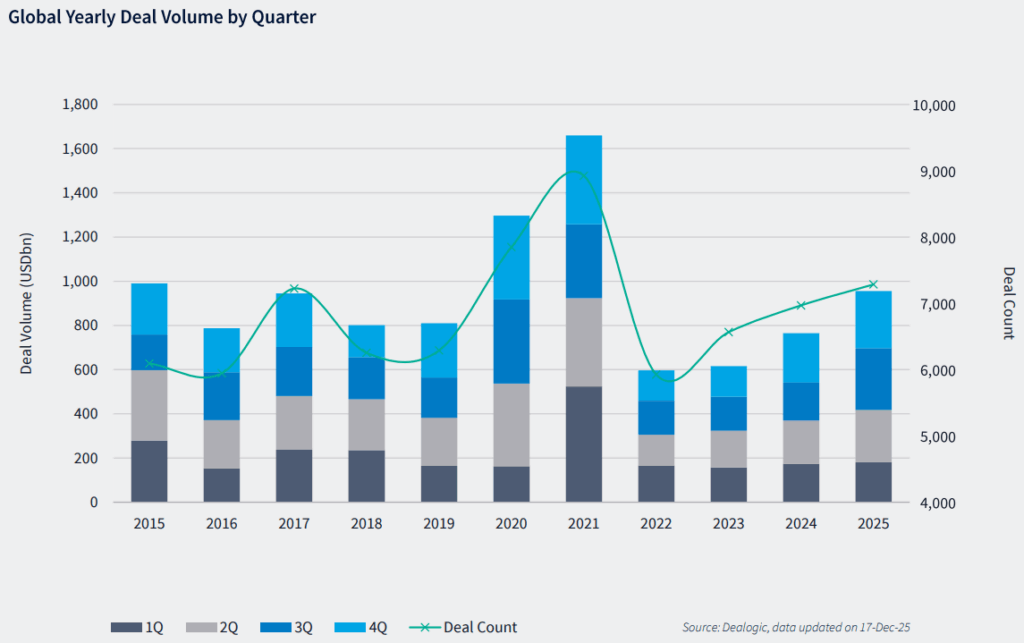Sponsors lead line-up of issuers prepping former sale candidates for IPOs in 2025 – ECM Pulse EMEA
Large-cap exits have been notoriously difficult for European private equity (PE) firms in 2024, and a tough selling environment is leading several sponsors, and other issuers, to pull the trigger on public listings instead.
This news service has previously reported on the average holdings for private equity hitting a new five-year high in 2024, as PEs have been unable to find buyers for assets at a price that generates the return general partners (GPs) want and limited partners (LPs) expect.
This has led to many sponsors shifting instead to the IPO market, particularly for large-cap assets too big to sell.
Source: Dealogic
The highest profile of these names is Stada Arzneimittel AG, the German large-cap pharmaceutical group.
This news service previously reported that Bain and Cinven are now pressing firmly ahead with IPO plans for the first few months of 2025.
The sponsors had been in deep negotiations to sell the company to US-based private equity firm GTCR, but the sellers and buyers failed to strike a deal for Stada.
Alongside Stada, Nordic sponsor Nalka Invest has selected banks for the IPO of its Swedish medical supplies distributor Asker Healthcare after pivoting away from a sale track.
Hotelbeds investors Cinven, EQT [STO:EQT] and Canadian Pension Plan Investment (CPPI) are resolved to conduct an initial public offering for the company after shutting the door on several private bids, as reported.
This news service also previously reported that Hotelbeds received exploratory inbounds from private bidders in late 2023, before deciding that a public listing was the best option for the asset
Sponsors are now more actively returning to dual track processes with an IPO as the fallback option should a full exit not materialise, a consultant said.
TenneT, a Dutch state-owned power network manager, plans to launch a multi-track process to sell down its stake in its German business in 2Q25 at the earliest, say four sources familiar with the situation.
The company is keeping its options open on a minority sale, listing, or even both, said one of the sources.
However, the company was initially in talks to sell the division to the German state, but those talks fell through.
ECM banker noted that most sale-to-IPO candidates in the pipe are falling back on IPOs not because of quality but because they were simply too large or complex.
This dynamic was also true for Unilever‘s [LON:ULVR] ice cream business, which the company had considered selling. However, the unit proved too large for many sponsors and the company decided to pursue a spin-off listing instead.
A takeaway from this year for any sponsor, or IPO seller seeking to list in Europe in 2025 will be to not overly push on price.
The best sponsor sell-downs have been ones where the sellers have taken a big discount to peers to get the IPO across the line and allow the new company to prove itself as a listed entity.
The IPO of Galderma [SWC:GALD] by EQT and the listing of Springer Nature by BC Partners were both notable examples of this tactic.
EQT has since managed to sell down through two substantial trades in Galderma, at a far higher multiple than they would likely have been able to achieve at IPO.
Missing in Auction
This news service’s Missing in Auction (MIA) universe is awash with multi-billion enterprise valuation companies that appointed advisors and launched processes but were unable to find a buyer at the right price or terms.
These include sponsor-backed companies like BC Partners-owned VetPartners, BlueGem’s Mamas and Papas, and Permira’s Best Secret.
As always with IPOs, the reputation and experience of the vendor matters. Permira has recently undertaken a positive change in its approach to ECM and BC’s successful listing of Springer Nature could pave the way for more listings of its portfolio.
There are also a few non-sponsor-backed companies like Dolce & Gabbana and Boots that had been looking at private investment and could now revive or kickstart IPO plans.
An IPO might also be more suitable for assets that have faced government blocks on international buyers in sensitive sectors. French pharmaceuticals group Biogaran, for example, called off a sale despite receiving offers and public markets might be an easier route to realisation.
To see more Missing in Auction companies, visit Mergermarket’s Auctions platform.
Investor appetite
Traditionally there has been some scepticism among ECM investors about investing in assets that have failed to sell in auction.
However, given the quality of the assets that could be brought to the market by sponsors and corporates, there are hopes that IPO investors will be receptive.
“I think in these cases investors are very open to these companies that have been up for sale before as it’s not due to lack of demand from the private equity but that many just can’t put deal packages together,” said the banker.
An investor concurred and noted that large-cap assets will always find an audience among the ECM buyside. “We and other investors are primarily focused on aftermarket liquidity in any IPO we look at that’s the key issue and key risk for us,” he noted.
Companies positioned for sale that transition to IPOs are generally well received by investors, though pricing remains critical, noted a buyside-focused banker. “Issuers and their advisers must focus on achieving the right pricing while considering the long-term value they can extract,” he added.
Bad pricing can lead to failed IPOs and one thing the buyside is far less tolerant of is IPO candidates that they have previously rejected, the first banker said.
In this case, EQT and BC Partners remain the example sponsors should follow from this year when thinking of next year’s pipe.












